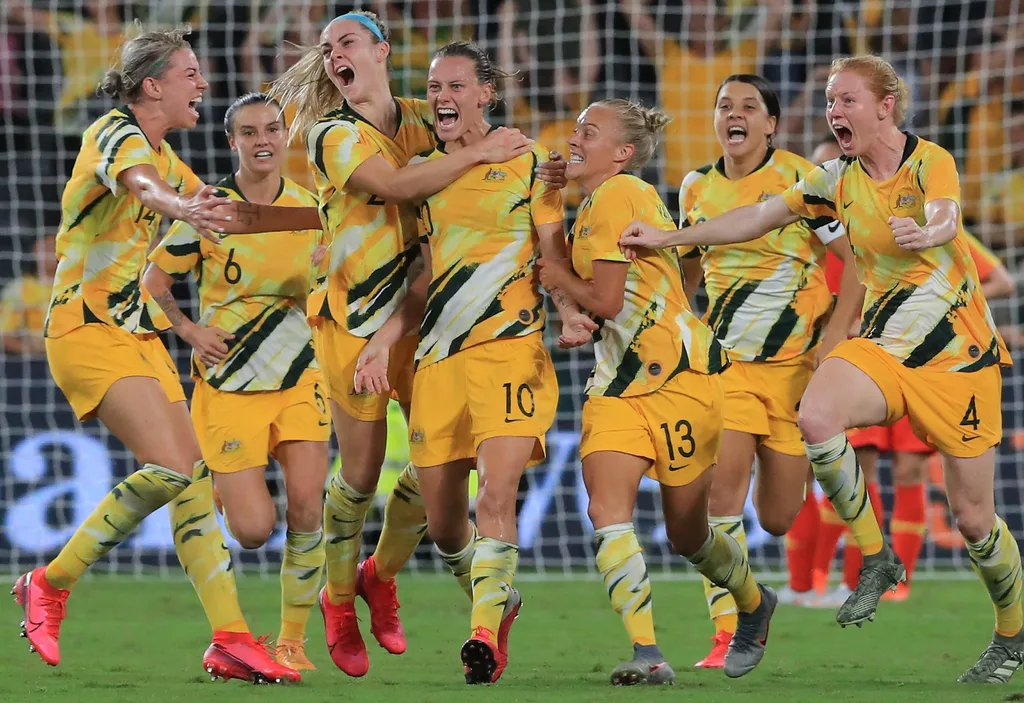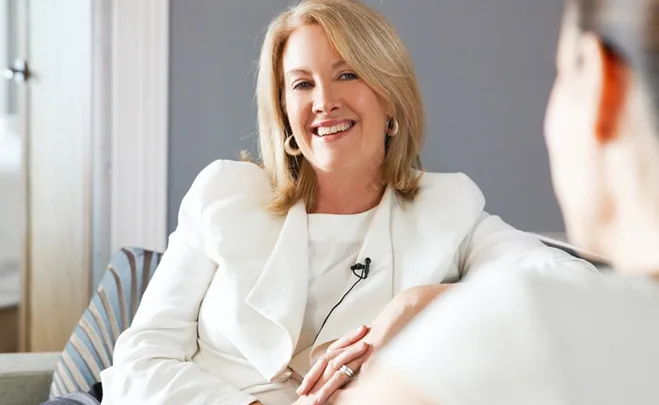The lightbulb moment hit Liz Broderick while she travelled the world as part of her work with the United Nations. In every country she visited, sport was played—it surmised a major part of its community and culture. But its inclusion of females told another story.
“Whenever I go to a country, I always look at whether girls are playing sport,” the former Sex Discrimination Commissioner and UN Special Rapporteur tells marie claire Australia. “I think girls’ engagement in sport actually tells us something about the status of women and girls in that particular country.”
She raises a valid point, and that’s why Broderick is now advocating for equality and representation for women in sport—and she’s starting with Australia.
Broderick has become a Football Australia Legacy ’23 Ambassador in line with the 2023 FIFA Women’s World Cup, a role in which she hopes to “show girls and women that we have a place in elite sport equally with men”.
Of course, she’s not downplaying the leaps and bounds the industry has already travelled in this regard. The last seven years have seen women recognised as elite athletes in traditionally male dominated sports—from the creation of the AFLW in 2016 to the outpouring of support and rapid popularity growth for the Matildas after they fought their way to fourth place at the 2020 Tokyo Olympic Games (the best result they’ve ever achieved at the games).
“Everyone has a women’s team,” Broderick says. “And a number of those teams are professional now as well, so the women athletes are being paid.”
But are they being paid equally to men in the equivalent sports? Broderick is quick to answer: “No.”

With the exception of the The Matildas, who are the first female football team in the world to receive the same pay as their male counterparts, Broderick says we still have “a way to go,” in achieving pay equality in sport. And the delay isn’t in anyone’s best interests—men very much included.
“Most sports organisations understand that if they want to attract girls and women, they need equal facilities, playing time and training sessions,” she explains.
But there’s one area where change has been woeful: Women as the heads of national sporting organisations.

As it stands, not one major sporting organisation in Australia has a female leading it—that’s not exactly surprising given how notoriously male dominated the industry has been in the past. But change is well overdue, and gender-washing (whereby women are hired as a means to improve a company’s reputation, as opposed to making an ethical change) won’t be tolerated. This is meant quite literally—organisations are now being watched.
Broderick spearheaded the ‘Champions Of Change’ report as a means to bring greater equality to sport—and to do this, it tracks the progress of sporting organisations against a framework that encourages men to step up beside women and create a culture that’s inclusive and transparent. Every two years, a report is released which tracks each sporting organisation’s progress against this framework.
“Every sport will start somewhere, whether that’s football, the AFL or Rugby Union—historically they’ve been invested in and run by men, for men. If they’re going to get serious about [equality] then over time we want to see equal prize money, equal pay and equal investment and sponsorship.”
Of course, this issue isn’t isolated to sport. Pay disparities between genders has existed for years in Australia, and the pay gap currently stands at 14.1 per cent, per the Workplace Gender Equality Agency.
This issue, and the culture that continues to feed it seeps into so many elements of daily life. Broderick reiterates: “We live in a country where the majority of caring work is done by women. We live in a country where there’s still high levels of sexual assault in workplaces. We live in a country where one woman a week is murdered by intimate partner. We live in a country where there’s an absence of women in the private sector.”
It’s a concerning picture—but it’s not one that’s finite.
“I feel optimistic about our progress,” Broderick adds. That progress includes the Labor government’s pledge of $4.7 billion to go towards early childhood education and care to allow parents the option to take on more paid work. It will also invest $531.6 million to expand the Paid Parental Leave scheme to 26 weeks.
It’s small steps in the right direction, and by combining this progress with an education system that normalises a balance of responsibility between men and women, we could see some real, tangible change.
“If you learn early on that [caring and housework] is women’s work—and not dads work—you take that belief into your own life,” Broderick adds, “We need to make sure that that’s not the case.”
The work continues, and Broderick is a key part of this—particularly in sport. With the likes of Sam Kerr, Emma McKeon and Ash Barty’s success in our history books, Australia clearly has plenty more to give.










